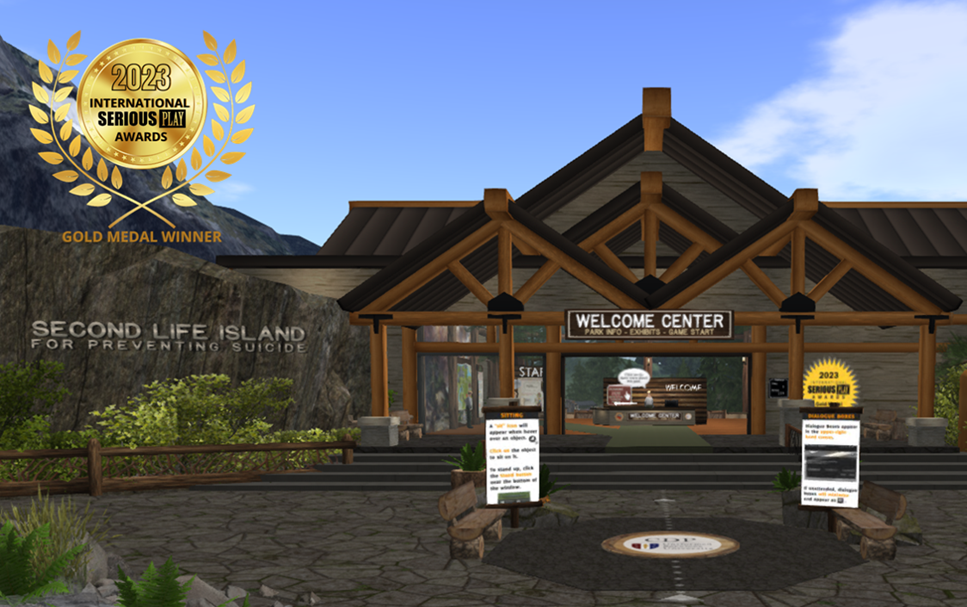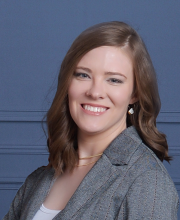Staff Perspective: Introducing the Second Life Island for Preventing Suicide
Over the last few years, the Center for Deployment Psychology (CDP) has been hard at work developing a first of its kind training for the core components of cognitive behavioral therapy for suicide prevention (CBT-SP). The resulting Second Life Island for Preventing Suicide, or SLIPS, is an asynchronous, avatar-based learning environment focused on reinforcing the concepts learned during traditional two-day CBT-SP workshops.
Set within a national park, learners first arrive at the Welcome Center where they are greeted by our park rangers to receive an orientation to the Island. Learners can visit the Firing Range to learn about firearm safety; stop by Ella’s House to secure lethal means; or select a patient to practice conducting risk assessments, safety planning, lethal means safety, and relapse prevention. SLIPS was designed using principles of gamified learning, and each skill area is presented as an activity shared with the patient. For example, the experience starts with a nature hike to explore suicide risk and then a jeep tour of the safety planning caves.
The asynchronous aspects of SLIPS allow learners to refresh their suicide prevention skills on demand, whenever they feel it would be helpful. As learners progress through the park, they are required to make choices similar to those they would face during a session with a patient. With each decision, learners receive feedback from our suicide prevention subject matter experts explaining the rationale for each choice.
SLIPS provides the opportunity to work with three diverse cases: Jim, Reyna, and Matt. Jim is an Air Force Veteran in his early 60s. Reyna is a member of the Army National Guard and a single mother of two children. Matt is an active duty Navy officer with an adopted son whom he shares with his husband. Each case is complex and thoughtfully created to feel like a real patient. This involved pulling from the clinical experiences of our team and consulting with individuals with lived experience on the development of the cases and construction of their homes to ensure the cases felt true to the patients they represent. Each case can be completed for 2 continuing education credits from the American Psychological Association, the Association of Social Work Boards (ASWB) Approved Continuing Education (ACE) program, and the New York State Education Department's State Board for Psychology.

We invite you to come and see all that SLIPS has to offer. We are holding grand openings on Wednesday, 18 September from 6:30-9:00 P.M. EST, and Friday, 20 September from 12:30-1:30 P.M. EST. Members of the CDP development team will be available to provide tours and to answer any questions. We hope to see you there!
To visit SLIPS or CDP’s other Virtual Worlds, visit https://deploymentpsych.org/virtual-provider-training-in-second-life
To learn more about our Gold Medal for Healthcare Games at the 2023 International Serious Play Awards in Toronto, Canada, visit https://news.usuhs.edu/2024/07/usu-center-for-deployment-psychology.html
For continuing education credit information, visit https://deploymentpsych.org/virtual-suicide-prevention
SLIPS was funded by an intramural award from the Uniformed Services University of the Health Sciences.
The opinions in CDP Staff Perspective blogs are solely those of the author and do not necessarily reflect the opinion of the Uniformed Services University of the Health Science or the Department of Defense.
Maegan M. Paxton Willing, Ph.D., MPH, is a Research Psychologist (HJF) with the Center for Deployment Psychology (CDP) at the Uniformed Services University of the Health Sciences in Bethesda, Maryland. Dr. Willing’s research broadly examines mental health in military populations. Her primary research interests include the development, correlates, and treatment of sleep and posttraumatic stress disorder in service members, with a particular emphasis on posttraumatic nightmares.
Over the last few years, the Center for Deployment Psychology (CDP) has been hard at work developing a first of its kind training for the core components of cognitive behavioral therapy for suicide prevention (CBT-SP). The resulting Second Life Island for Preventing Suicide, or SLIPS, is an asynchronous, avatar-based learning environment focused on reinforcing the concepts learned during traditional two-day CBT-SP workshops.
Set within a national park, learners first arrive at the Welcome Center where they are greeted by our park rangers to receive an orientation to the Island. Learners can visit the Firing Range to learn about firearm safety; stop by Ella’s House to secure lethal means; or select a patient to practice conducting risk assessments, safety planning, lethal means safety, and relapse prevention. SLIPS was designed using principles of gamified learning, and each skill area is presented as an activity shared with the patient. For example, the experience starts with a nature hike to explore suicide risk and then a jeep tour of the safety planning caves.
The asynchronous aspects of SLIPS allow learners to refresh their suicide prevention skills on demand, whenever they feel it would be helpful. As learners progress through the park, they are required to make choices similar to those they would face during a session with a patient. With each decision, learners receive feedback from our suicide prevention subject matter experts explaining the rationale for each choice.
SLIPS provides the opportunity to work with three diverse cases: Jim, Reyna, and Matt. Jim is an Air Force Veteran in his early 60s. Reyna is a member of the Army National Guard and a single mother of two children. Matt is an active duty Navy officer with an adopted son whom he shares with his husband. Each case is complex and thoughtfully created to feel like a real patient. This involved pulling from the clinical experiences of our team and consulting with individuals with lived experience on the development of the cases and construction of their homes to ensure the cases felt true to the patients they represent. Each case can be completed for 2 continuing education credits from the American Psychological Association, the Association of Social Work Boards (ASWB) Approved Continuing Education (ACE) program, and the New York State Education Department's State Board for Psychology.

We invite you to come and see all that SLIPS has to offer. We are holding grand openings on Wednesday, 18 September from 6:30-9:00 P.M. EST, and Friday, 20 September from 12:30-1:30 P.M. EST. Members of the CDP development team will be available to provide tours and to answer any questions. We hope to see you there!
To visit SLIPS or CDP’s other Virtual Worlds, visit https://deploymentpsych.org/virtual-provider-training-in-second-life
To learn more about our Gold Medal for Healthcare Games at the 2023 International Serious Play Awards in Toronto, Canada, visit https://news.usuhs.edu/2024/07/usu-center-for-deployment-psychology.html
For continuing education credit information, visit https://deploymentpsych.org/virtual-suicide-prevention
SLIPS was funded by an intramural award from the Uniformed Services University of the Health Sciences.
The opinions in CDP Staff Perspective blogs are solely those of the author and do not necessarily reflect the opinion of the Uniformed Services University of the Health Science or the Department of Defense.
Maegan M. Paxton Willing, Ph.D., MPH, is a Research Psychologist (HJF) with the Center for Deployment Psychology (CDP) at the Uniformed Services University of the Health Sciences in Bethesda, Maryland. Dr. Willing’s research broadly examines mental health in military populations. Her primary research interests include the development, correlates, and treatment of sleep and posttraumatic stress disorder in service members, with a particular emphasis on posttraumatic nightmares.

